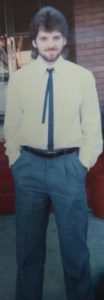When I was a teenager, I set my mind on building the perfect superhero physique. I imagined that if I worked out hard enough, I’d get big muscles and look like a total stud.

 After 3 years of working out.
After 3 years of working out.I lifted weights, ran and swam multiple times a week without fail.
I joined Pitt’s wrestling team. I drank protein shakes. After 3 years of training, I was still the same 135 lbs.
After a few more years of lifting weights, I finally conceded that my dreams of having big muscles would never come true.
No amount of hard work would get me there.
Instead I embraced the type of workouts that seemed to fit me better. As a result, I feel like a superhero even if I don’t look like one.
This got me thinking about was an interview I heard recently with Joel Comm, a serial entrepreneur.
- He started ClassicGames, a gaming website in the late 90s. Yahoo contacted him and bought it for $1M after 18 months.
- On a lark, he wrote the iFart app. It became one of the top iphone apps of all time.
- He wrote several best selling books.
In addition to these breakout successes, he had some disappointing failures and some mediocre results from other businesses he owned.
He said something like this,
When I put in the most effort I did not have my biggest successes.
Paradoxically, my biggest successes came with less effort. They seemed to flow naturally.
I worked on my successful ventures, but not nearly as hard as I did on the ones that were less successful.
I now believe that if you are working hard on something but not having success, more hard work will not improve things. You need to do something different.
If you’ve read any of my other articles, you know I like working hard.
There are a lot of benefits to working hard including: building resilience, learning from failures, setting yourself apart, and learning how to overcome obstacles.
Hard work has definitely benefitted me throughout my life.
But Joel’s ideas got me thinking about some of my successes:
Academics- I was always at the top of my class. I used to think it was because I was smart and worked harder than everyone else. Looking back, I am smart, but I also had the right temperament for school and can learn from books easily.
Stargate– Worked my way from sales rep to director in 4 years while tripling my salary. Helped grow company from 35 to 500 employees. It was a lot of work but always felt easy – almost natural. People wanted to buy what we sold. The dotcom boom was happening. I was in the right place at the right time selling the right thing.
Citrix- Worked my way up from sales rep to director in 5 years while tripling my salary. I had some really hard times here, but also many good ones. Ironically, I went to President’s Club and earned my biggest commission check when I managed my smallest team that had the fewest sales. I was in the right place at the right time with the right quota.
In my other jobs, I had varying amounts of success.
In all of them, I worked really hard (especially the manual labor ones).
Yet, despite my hard work, my results in these jobs paled in comparison to results I had in the three examples above.
Should we stop working hard?
I don’t think so. The lesson I take from Joel’s podcast and my own track record, is that it’s important to keep an eye on results.
This means we have to step back, look at the data and evaluate what’s happening.
If you are already working really hard and not seeing good results, then working harder will not improve things.
Here are common cases of this I’ve seen in sales:
- If you are cold calling 50 leads a day and only creating 1 opportunity, doubling your cold calls might enable you to create 2 opportunities but won’t yield the exponential revenue growth that many startups are seeking.
- If your sales team is constantly missing quota, hiring more reps most likely won’t solve your problem.
- Forcing inside sales reps to work longer hours, evenings and weekends will backfire. You might see a short term bump in results, but over the long term it’s never sustainable.
Getting better results might require a different sales manager, new sales reps, more useful training or a better product.
Or you might be in the wrong place at the wrong time or chasing something unrealistic (like I was when lifting weights).
In those cases, I’d recommend changing your objectives or finding a new job, instead of continuing to beat your head against the wall.
Good luck and good selling,
Steve